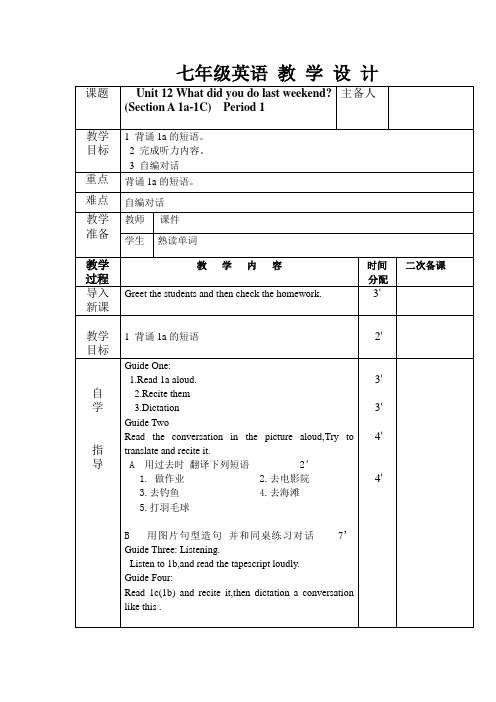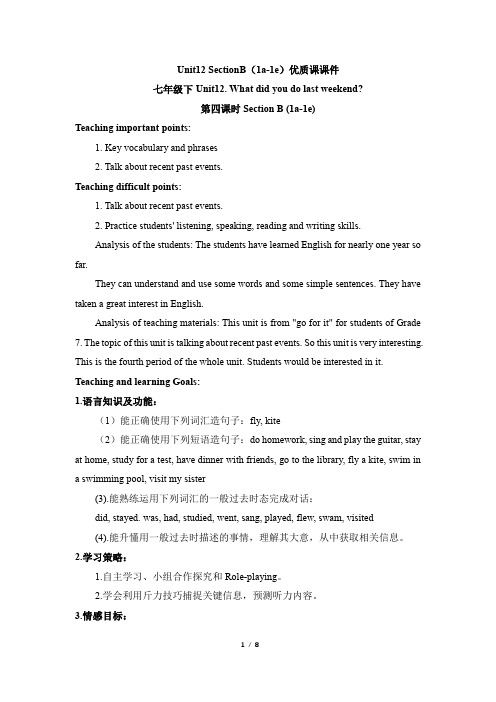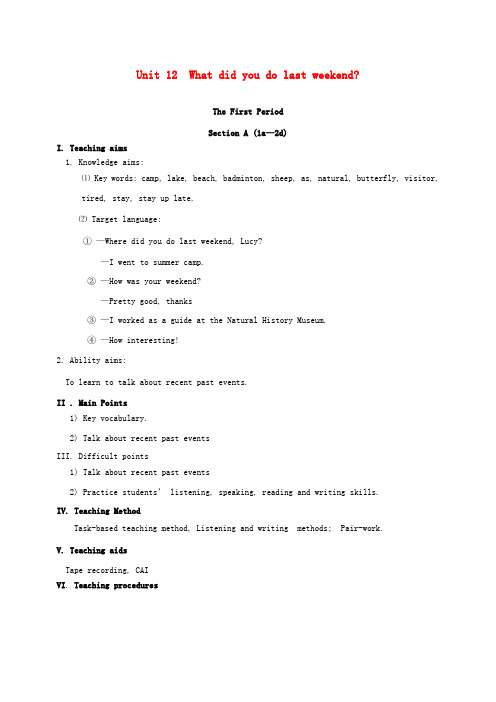人教版七年级下册英语Unit 12 What did you do last weekend教案
人教版新目标英语七下unit 12教学设计

教学
目标
1背诵1a的短语。
2.完成听力内容。
3.自编对话。
2'
自
学
指
导
Guide One:
背1a的短语。完成1b
Guide Two
Finish Listening 1c check the answers
Guide Three:
Make a conversation with a parter like 1d and 1e
3'
教学
目标
1阅读完成对语篇的大意理解
2通过自主阅读,找出语篇中的疑难点,并通过小组合作向老师寻求帮助等多种学习方式解决问题。
2'
自
学
指
导
Guide One:
Read the passage aloud after the tape.
Translate the passage to the students
D.Where did your brother go last Sunday
15'
总结
作业
Summary.
Guide Ss to summarize what they’ve learnt
Homework
1.背诵1a的短语。Finish the.exercises.
3'
板
书
设
计
Drills:
What did you do last weekend?
A.didn’t do B.not did
C.doesn’t D.didn’t
2.My brotherhis homework yesterday morning.
人教版七下英语Unit 12 What did you do last weekend课件

Part III Exercises
趁热打铁
一、单项填空
1. — What’s it? I feel something ___B_____ in the
house?
— Maybe it is a mouse. We should keep a cat.
A. move
B. moving
C. to move
fly
kite
fly a kite
tent
moon
snake
jump
forest
ear
Words
as natural
tired stay stay up late away
Expressions
prep. 作为;当作 adj. 自然的 adj. 疲倦的;疲劳的 v. 停留 深夜不睡; 熬夜 adv. 离开;远离
She went to Beijing last week. →She didn’t go to Beijing last week. →Did she go to Beijing last week? →Yes, she did./No, she didn’t. →Who went to Beijing last week? →Where did she go last week? →When did she go to Beijing?
Key Points
一、一般过去时 1. 谓语动词为be:
肯定句:主语+was/were+其他. 否认句:主语+was/were+not+其他. 一般疑问句:Was/Were+主语+其他? 两种答复: Yes, …was; No, …wasn’t.
特殊疑问句:特殊疑问词+was/were+主 语+其他?
人教版英语七下U12 What did you do last weekend 讲义(学生版)

Unit12 What did you do last weekend?一、重点词汇及拓展1. campv. __________________ 去野营n. __________________ 去野营2. asprep. ______e.g. ________________________ 我在这儿作导游。
prep. ______e.g. ________________________ 他和我跑得一样快。
____________ 和...一样____________ 众所周知3. natural adj. ______e.g. ____________________________________自然博物馆里有许多蝴蝶。
______ n. 自然____________ 在大自然中____________ 享受大自然4. tired adj.__________________劳累;疲倦5. stayv.__________________待在家v.__________________保持健康____________熬夜____________远离...6. run away ______put away ______take away ______throw away ______give away ______go away ______7. mouse n.______复数:______8. shout v.____________呼喊...______朝...喊叫(带有情绪)9. language n.____________身体语言____________语言的美____________第二语言10. flyv.______e.g. ____________________________________他们在湖边放风筝。
____________飞去某地n.______e.g. __________________ 我讨厌苍蝇。
(水滴系列)七年级英语下册 Unit 12 What did you do last weekend生词课讲义 (新版)人教新目标版

fly – flew(v.飞) kite(n.风筝) fly a kite(放
风筝) high(adj./adv.)高的(地)
He (flew a kite)放风筝,and
the kite flewhig(h
)高.
mouse(老鼠;耗子) (pl .mice)
ear(n.耳朵)
What does the MickeyM(ouse ) 老鼠 look like?
• 2. The Ss read the difficult words in a group.(The teacher walks around to see whether they have any questions.)
Ask the Ss to read after the tape, imitate their
played badmintion
We
(
)
打羽毛球 last
weekened.
What did … do last weekend ?
stay(v.停留;待)
stay up late(深夜不睡;熬
夜)十to do something
tired(adj.疲倦的;疲劳的)
She ( stayed up late to wo)rk
language n.语言
scared adj.惊慌的;吓坏了的
• 二. Remember the difficult and the most
useful words and phrases by matching
themselves with their meanings.
• 1.work as a teacher
butter(n.黄油)+fly(n.苍蝇 v.
七年级英语人教版下册Unit12_SectionB(1a-1e)优质课教案(辽宁省)

Unit12 SectionB(1a-1e)优质课课件七年级下Unit12. What did you do last weekend?第四课时Section B (1a-1e)Teaching important points:1. Key vocabulary and phrases2. Talk about recent past events.Teaching difficult points:1. Talk about recent past events.2. Practice students' listening, speaking, reading and writing skills.Analysis of the students: The students have learned English for nearly one year so far.They can understand and use some words and some simple sentences. They have taken a great interest in English.Analysis of teaching materials: This unit is from "go for it" for students of Grade 7. The topic of this unit is talking about recent past events. So this unit is very interesting. This is the fourth period of the whole unit. Students would be interested in it. Teaching and learning Goals:1.语言知识及功能:(1)能正确使用下列词汇造句子:fly, kite(2)能正确使用下列短语造句子:do homework, sing and play the guitar, stay at home, study for a test, have dinner with friends, go to the library, fly a kite, swim ina swimming pool, visit my sister(3).能熟练运用下列词汇的一般过去时态完成对话:did, stayed. was, had, studied, went, sang, played, flew, swam, visited(4).能升懂用一般过去时描述的事情,理解其大意,从中获取相关信息。
人教新目标版七年级英语下册Unit12Whatdidyoudolastweekend?优质教案

Unit 12 What did you do last weekend?The First PeriodSection A (1a—2d)I. Teaching aims1. Knowledge aims:⑴ Key words: camp, lake, beach, badminton, sheep, as, natural, butterfly, visitor,tired, stay, stay up late.⑵ Target language:①—Where did you do last weekend, Lucy?—I went to summer camp.② —How was your weekend?—Pretty good, thanks③ —I worked as a guide at the Natural History Museum.④ —How interesting!2. Ability aims:To learn to talk about recent past events.II . Main Points1) Key vocabulary.2) Talk about recent past eventsIII. Difficult points1) Talk about recent past events2) Practice students’ listening, speaking, reading and writing skills.IV. Teaching MethodTask-based teaching method, Listening and writing methods; Pair-work.V. Teaching aidsTape recording, CAIVI. Teaching proceduresReflections:The Second PeriodSection A (Grammar Focus – 3c )Ⅰ. Teaching aims1. Knowledge aims:⑴ Key words: away, mouse, baby, shout ,shout at, woof, language.⑵ Target language:—What did you do last weekend?—I did my homework.—Who visited her grandma?—Becky did.—Where did she go last weekend?—She went to a farm.—Who did she go with?—She went with her classmates.2. Ability aims:Talk about recent past events3. Emotion aims:To remember the key words and target language.II . Main Points1) Key vocabulary.2) Talk about recent past eventsIII. Difficult points1) Talk about recent past events2) Practice students’ listening, speaking, reading and writing skills. IV.Teaching MethodTask-based teaching method, PairworkV. Teaching aidsTape recording, some pictures.Reflections:The Third PeriodSection B ( 1a –1e )I. Teaching aims1. Knowledge aims:⑴ Key vocabulary: fly, kite, fly a kite.⑵ Target language:—Did you go anything interesting last weekend?—Not really, but I visited my sister.—My sister finished high school two weeks ago.2.Ability aims:To improve students’ listening, speaking, reading and writing abilitie s.3. Emotion aims: Learn to communicate with others .II. Main Points1) Key vocabulary.2) Talk about recent past events.III. Difficult points1) Talk about recent past events2) Practice students’ listening, speaking, reading and writing skills. IV. Teaching MethodTask-based teaching methodV. Teaching aidsTape recording, CAIVI. Teaching proceduresReflections:The Fourth PeriodSection B (2a – self check )Ⅰ. Teaching aims1. Knowledge aims:(1).Keywords: moon, jump, wake, forest, ear, sing-sang, study –studied, have –had, go-went, fly- flew, swim-swam, put up, get a surprise, shout to, up and down, wake...up,high school,⑵ Target language:---Did you go anything interesting last weekend?---Not really, but I visited my sister.---My sister finished high school two weeks ago.2. Ability aims: Train students’ reading and writing skills.3. Emotion aims: Help students learn from each other and work together .II. Main PointsTo learn to talk about weekend activities using simple past tense.III. Difficult pointsUse the simple past tense to write a passage.IV. Teaching MethodTask-based teaching methodV. Teaching aidsTape recording, pictures.Reflections:。
英语教案人教版七年级下册unit 12 what did you do last weekend section b
the target language.
1. Fast reading
Read the article and find the answer to this
question:
What did they see near the fire the next
morning?
(They saw a snake sleeping near the fire)
blackboard. Make the students read.
纳提高阅读的方法。
Step Ⅱ. Presentation
Call attention to the pictures. Ask students to
point to and use the past tense to describe as
备课序号:
上课班级:
授课 内容
Until12 Section B 1a-2c
上课时间
月 日 第___节
教具
multimedia
课型
Reading
教 学 目 标
重点 难点
知识与技能
过程与方法 情感态度与
价值观
1. 根据图片和对话等,预测新课内容; 2. 能够正确辨识一般过去时 3. 熟练掌握动词过去式的变化规则
小 结:
练 习:
板 书: 教 学 反 思
阅读方法指导,学生理解运
Ss read the article quickly and find the answers 用
to this question. Then check the answers with the class. 2. Careful reading Read the article and find the answers to the questions on 71.
初中英语人教版七年级下册Unit 12What did you do last we
Unit 12What did you do last weekend? 教学设计(Period 1)盐池五中袁学锋1.教材分析本单元是人教版新目标英语初一下册第12单元。
主要以周末活动为主线,以What did you do last weekend?为中心话题,主要运用what/where/who 引导的特殊疑问句来谈论周末活动“去了哪里,做了什么,和谁一起去的。
”功能是运用一般过去时谈论刚刚过去的一些常见周末活动。
这一话题贴近学生们的日常生活,也是继本学期第11单元后继续学习一般过去时的用法,符合学生的认知结构和年龄特征。
而本单元的重点就是用过去时态来谈论同学们周末活动,同时通过谈论周末活动来进一步学习一般过去时态。
2.学情分析学生在前面的Unit11对一般过去时已经进行了系统的学习,对它的用法已经有了一定的认识,这就降低了本课的学习难度。
学生学得轻松,从而树立信心,有利于学生更好的发展。
同时,初一学生对英语学习还保持着较浓厚的兴趣。
他们有极强的好胜心和表现欲,特别在乎他人的评价。
因此,课堂上,通过小组合作学习,小组竞争和激励性评价等多种方式,让每个学生都参与课堂活动,积极展示自我,不断提高自己的综合语言技能。
3.教学目标1.知识目标:单词: camp lake beach badminton2.句型:-- What did you do last weekend?-- Well, on Saturday morning, I played badminton.3.能力目标:能够用一般过去时描述自己在过去时间里所做的事情。
4.情感目标:a.帮助学生树立合作学习观点。
b.讲述美好的周末,树立学生享受生活,热爱美好的大自然情感。
4.重点难点教学重点:能运用一般过去时介绍自己或他人的周末活动.教学难点:(1)听力策略的培养(2)能在具体的语言环境中灵活运用所学时态和所学短语。
5.教学策略的选择与设计板、视频等技术的配合下设计了多种教学活动和环节,通过采用新颖多样的教学手段,创设生动活泼的教学情景,营造轻松愉快的课堂气氛,是每个学生都敢于和乐于开口说英语,并为他们提供了说英语的机会。
人教七年级英语下 Unit 12 What did you do last weekend (课1)
Sunday night
3. What did she do there? _S_h_e_t_o_l_d_t_h_e_v_i_s_it_o_r_s_a_b_o_u_t__th_e____ _b_u_t_te_r_f_li_e_s_a_n_d__th__ei_r_l_iv_i_n_g__h_a_b_it_s_.
4. Why is Paul tired now? B__e_c_a_u_se__h_e_s_t_a_y_e_d_u_p__l_a_te__to__w_a_t_c_h t_h_e__so_c_c_e_r_g_a_m__e_._______________
2d Role-play the conversation.
Paul: Hi, Lisa. How was your weekend?
Lisa: Great. Thanks. Paul: What did you do? Lisa: I worked as a guide at the
Natural History Museum.
What did you do last weekend, Li Lei?
Well, on Saturday morning, I played soccer.
1b Listen and write the day, morning,
afternoon or night below each
人教新目标版七年级英语下册Unit12WhatdidyoudolastweekendSectionB1a_1e教案新版
教学
目标
1.能听、说、认、读并理解本课的新单词。.
2.能掌握句 型:能掌握一般过去时的一般疑问句和特殊疑问句。
过程与方法:本节课利用多媒体、图片、小组对话等多种方式创设情境,调动学生的多种感官。
情感态度价值观:学会合理安排周末活动。
(2)—did you go last Satur day?
—I went to the Great Wall.
A.What B.how C.when D.Where
(3)hevolleyball last Friday?
A. Does;play B. Did;played C. Is ;playingD. Did;play
参考案例:
A:What did Sally do last weekend?
B:She did her homework.
7.两人一组,相互提问回答上周你同伴的活动。完成le。
参考案例:
A:What did you do last weekend?
B:I visited my grandparents.
T:Who did you go with?S:I went as the weekend?S:It was…
(2)Ask and answer in pairs.
Step 2.完成教材1a—1e的任务
1.教师领读词组,强调个别单词的读音,学生快速记忆词组并且两人一组互相提问。
环节说明:通过听说训练,学生更熟练地掌握交际用 语,通过小结训练,语言目标得以强化。
板
书
设
计
Unit 12 What did you do last weekend?
- 1、下载文档前请自行甄别文档内容的完整性,平台不提供额外的编辑、内容补充、找答案等附加服务。
- 2、"仅部分预览"的文档,不可在线预览部分如存在完整性等问题,可反馈申请退款(可完整预览的文档不适用该条件!)。
- 3、如文档侵犯您的权益,请联系客服反馈,我们会尽快为您处理(人工客服工作时间:9:00-18:30)。
1 / 10 Unit 12 What did you do last weekend? 第一课时 Section A(1a-2d) Target Navigation 【目标导航】 Key words and phrases: camp,lake,beach,badminton,sheep,as,natural,butterfly,visitor,tired,stay,stay up late Key sentences: 1.—What did you do last weekend? —Well,on Saturday morning,I played badminton. 2.—Who visited her grandma? —Becky did. Skills:学会谈论过去事件。 Emotion:积极参与小组活动,大胆展示。 The guidance of learning methods 【学法指导】 1.通过多媒体课件展示图片,创设情境,让学生对用过去时描述事件有感观的认识。 2.通过同伴之间编写、演练对话来操练句型和巩固新单词。 3.通过听录音并记录所听到的信息来巩固单词和句型。 Learning important and difficult points【学习重难点】 1.进一步学习过去时态的用法。 2.继续学习谈论过去事件;学会用疑问词who,what,when。
Teaching Steps 【教学过程】 Autonomous Learning Scheme 【自主学习方案】 预习指导与检测 (一)预习指导 1.根据单元标题和图片等,预测新课内容。 2.根据音标拼读新单词并牢记。 3.勾画出重点和疑难点。 (二)预习检测 英汉互译 1.做作业________ 2.去海滩________ 3.go boating________ 4.打羽毛球________ 5.去电影院________ 6.camp by the lake________ 7.visit my grandma____________ 8.备考____________ 9.work as a guide____________ 10.over____________ 11.How interesting!____________ 12.living habits____________ 13.kind of________ 14.熬夜________ 2 / 10
(Keys:1.do homework,2.go to the beach,3.去划船,4.play badminton,5.go to the cinema,6.在湖边野营,7.看望我的奶奶,8.study for the test,9.当导游,10.超过,11.多有趣啊!12.生活习惯,13.有点,14.stay up late) Classroom Learning Guidance Scheme 【课堂导学案】 【探究一】 1.Learn the phrases in 1a. 2.Finish 1a,then check the answers. 3.Look at the conversation,and learn the drills: —What did you do last weekend? —Well,on Saturday morning,I played badminton. 【探究二】 Listen and finish 1b.Check the answers. 【探究三】Pair work Practice the conversation in 1c.Then make your own conversations. 【探究四】Listening 1.Go through the sentences in 2a. 2.Listen to 2a and underline the words you hear. 3.Listen again.Write C for Carol,J for Jack or B for Becky next to the statements in 2a.Then check the answers. 【探究五】 Pair work 1.Student A asks questions with who,what or where and Student B answers.Finish 2c. 2.Role-play the conversation in 2d. 【知识点拨】 1.介词by的用法: (1)表示移动方向,意为“经过”。 如:My mother goes by the building every day.我妈妈每天从这栋楼旁经过。 (2)表示方式及手段,意为“用,靠,通过”。 如:I learn it by heart.我把它记在心头。 他以教书为生。 He ________ a living ________ teaching. (3)与交通工具名词连用时,名词前不用冠词,意为“乘,坐,用”。 如:那人是坐公共汽车来的。 The man came ________ ________. (4)相当于beside,意为“靠近,在……旁边”。 如:她站在窗边。 She stood ________ the window. 2.sheep为可数名词,意为“羊,绵羊”,其复数形式与单数形式同形。 如:树底下有一只羊。 There ________ ________ ________ under the tree. 树底下有3只羊。 There ________ ________ ________ under the tree. 【拓展】 单复数同形的名词还有:deer(鹿),fish(鱼),Chinese(中国人),Japanese(日本人)。 Classroom Evaluation Scheme 【课堂评价案】 详见当堂训练部分(即学生用书同步练习题)。 3 / 10
Teaching Reflection 【教学反思】 本单元继续学习谈论过去的事件,所以本节课通过多媒体课件展示图片,创设情境,让学生对各种周末活动有感观的认识;通过同伴之间编写、演练对话来操练句型和巩固新单词;通过听录音并记录所听到的信息来巩固单词和句型,通过小组活动,让学生大胆展示,学习掌握新单词和句型:camp,lake,beach,badminton,sheep,as,natural,butterfly,visitor,tired,stay,stay up late; —What did you do last weekend? —Well,on Saturday morning,I played badminton. —Who visited her grandma? —Becky did.
第二课时 Section A(Grammar Focus-3c) Target Navigation 【目标导航】 Key words and phrases: away,mouse,baby,shout,language,run away,shout at… Key sentences: (1)—What did you do last weekend? —I did my homework./We went boating. (2)—Who visited her grandma? —Becky did. (3)—Where did she go last weekend? —She went to a farm. (4)—Who did she go with? —She went with her classmates. Skills:对过去的事情进行询问。 Emotion:通过询问同学间过去所做的事情,增进同学间的感情。 The guidance of learning methods 【学法指导】 Group work,pair work Learning important and difficult points【学习重难点】 1.总结归纳Section A部分语法重点。 2.将所学知识学以致用。
Teaching Steps 【教学过程】 Autonomous Learning Scheme 【自主学习方案】 预习指导与检测 (一)预习指导 1.根据Grammar Focus,归纳Section A部分语法重点。 2.勾画出重点和疑难点。 (二)预习检测 英汉互译 4 / 10
1.熬夜________ 2.冲……大声叫嚷________ 3.跑开________ 4.mouse(复数)________ 5.living habits________ 6.language________ 7.他和谁一起去的? ________ ________ he go ________? (Keys:1.stay up late,2.shout at,3.run away, 4.mice,5.生活习惯,6.语言,7.Who did,with) Classroom Learning Guidance Scheme 【课堂导学案】 【探究一】Grammar Focus 1.Give a summary about it. 2.Try to recite it. 【探究二】 1.Go through 3a&3b quickly. 2.Finish 3a.Fill in the blanks with who,what,when,where or how. 3.Complete the blanks in 3b with the correct forms of the words in the box. 4.Check the answers and then read together. 【探究三】 Group work Think of two things you did last weekend.Draw pictures of them.Your classmates guess what you did. 【探究四】Group work:归纳疑问词who,what,when,where,how的区别,并造句。 Who________________________________________________________________________ What________________________________________________________________________ When________________________________________________________________________ Where________________________________________________________________________ How________________________________________________________________________ 【知识点拨】 1.shout的用法: shout动词,意为“呼叫,喊叫”,常用词组shout at sb./to sb.冲某人呼叫、喊叫,前者多指因为生气而非善意地对某人吼叫,后者多指因为距离远而不得不大声喊叫。 如:He was so angry that he shouted at everyone present. 2.away的用法: away作副词,意为“远离、离开、消失”。 常用短语有far away(远离),go away(走开),run away(跑开),right away(立刻、马上),away from(距……多远)。 根据汉语提示填空。 (1)Tom,stay________(远离)from here,please. (2)It's only three kilometers ________(距……远)here. (3)The giraffe ________(跑开)at once when he saw the tiger. (4)He phoned his mother ________(马上). Classroom Evaluation Scheme 【课堂评价案】 详见当堂训练部分(即学生用书同步练习题)。
